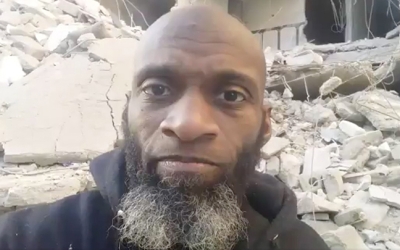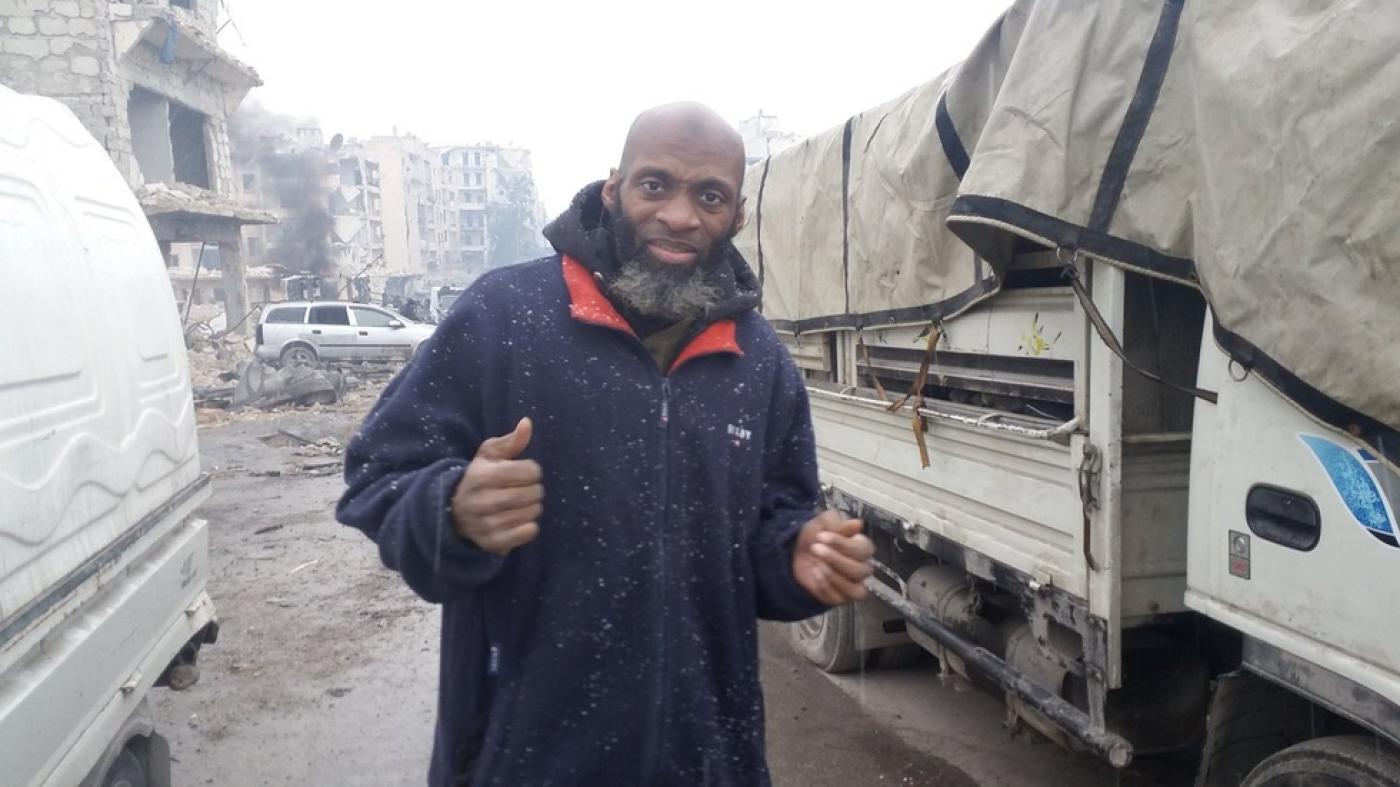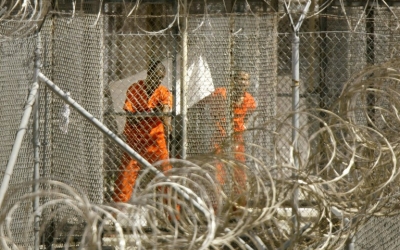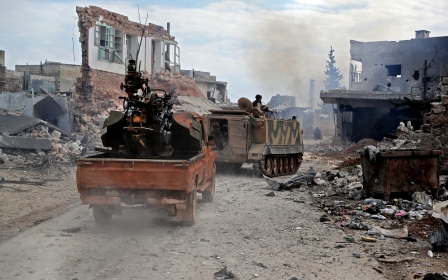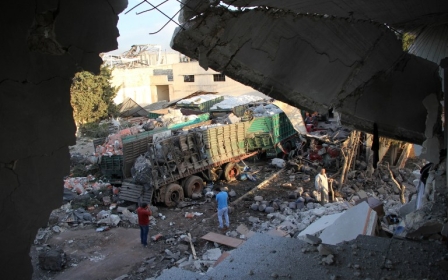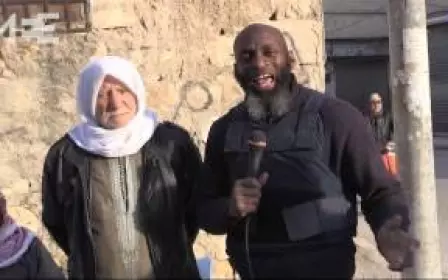Bilal Abdul Kareem: The conscience of Syria's opposition
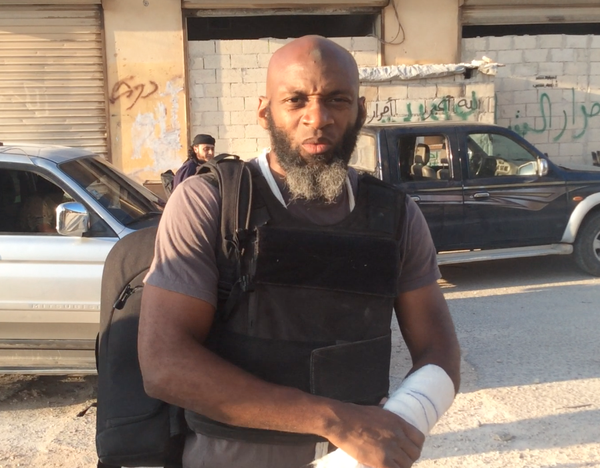
When I got a call from Syria on Friday telling me that American journalist Bilal Abdul Kareem had been taken into custody by Hay'at Tahrir al-Sham (HTS) forces, I was disturbed but not surprised.
I had been speaking with Bilal over the past few weeks about the case of British aid worker Tauqir “Tox” Sharif, and on the importance of getting justice for him after his arrest by HTS. Tox was initially detained by HTS forces in late June and freed after three weeks, only to be detained again.
During his imprisonment, Tox said that he was systematically tortured by an HTS interrogator. The technique used against him is called bastinado, which involves whipping the soles of the feet, causing excruciating pain but leaving no marks. It’s widely used by Syrian President Bashar al-Assad’s regime against opponents.
Torture and prisoners' rights
During a court visit last week, Tox had a chance encounter with his alleged torturer and immediately confronted him. An altercation ensued, after which the same HTS official brandished a gun and took both Tox and his driver into custody.
New MEE newsletter: Jerusalem Dispatch
Sign up to get the latest insights and analysis on Israel-Palestine, alongside Turkey Unpacked and other MEE newsletters
For his part, Bilal had been addressing the issue of torture, prisoners’ rights and due process for many years. We’d spoken at length, especially because of my own experience of these subjects. Bilal was aware that everyone is capable of torturing, including those who were once victims.
In 2015, long before HTS took control of Idlib, Bilal interviewed me about prisoners’ rights and torture. He was concerned that paramilitary groups might descend to the lows of the Assad government, and that the conflict had become so bitter that cases of torture would be inevitable. But he was also optimistic that a written charter presented by various factions guaranteeing prisoners’ rights would be implemented.
I have known Bilal for many years, and have enjoyed his company at different times in Britain, Egypt and Syria. He’s funny, intelligent, headstrong and brave.
In 2012, I spent time with both Bilal and Tox, who were working in northern Syria. Around that time, I got word that a local militia had taken three people I knew into custody. They were charged with “splitting the ranks” and “misappropriation of funds” - charges very common among rival rebel groups. I was asked to intervene.
Echoing screams
Bilal and Tox accompanied me to the holding centre, but only I was allowed in. The prison was just in a house, in which living rooms were used for interrogation and closets as prison cells. As I spoke to a young Saudi interrogator about the charges and treatment of prisoners, I heard sharp thuds followed by screams, which echoed around the forecourt where we sat.
I asked if they were torturing the prisoners. The interrogator replied: “This isn’t torture. This is a type of striking that is permitted in Islam.”
Bilal and Tox had been waiting outside, but they'd heard the screams. Initially, they'd thought they were my screams
I challenged him and quoted the saying of the Prophet Muhammad (peace be upon him): “Verily, Allah punishes those who carry out torture against people in this life.” They eventually let me see one of the prisoners, briefly, before asking me to leave.
Bilal and Tox had been waiting outside, but they’d heard the screams. Initially, they’d thought they were my screams.
The prisoners were eventually freed after our intervention, but one, a young Egyptian, could barely walk because his feet had been beaten so badly. I will never forget the look on his face.
Even then, Bilal was one of the few people who fearlessly spoke out against the torturers; most went on to join the Islamic State and continued to threaten Bilal and Tox until the group’s demise.
Offices targeted
I remember once asking Bilal if perhaps we, as Muslims from the West, were trying to impose our own vision and understanding of these matters on a people that didn’t want such things. Bilal replied in his American English: “No man! Ain’t no cat I ever met likes being tortured.”
Bilal’s intrepid reports from the front lines with various rebel factions were shared by many mainstream media outlets throughout the English- and Arabic-speaking world. As a result, rebel groups trust Bilal and his media outlet, On the Ground News (OGN). Conversely, detractors call him a mouthpiece for terrorists.
In 2016, Bilal went to report on the deteriorating situation in eastern Aleppo. His intended short stay turned into life under siege for more than four months. His reports, through the incessant bombing, gave voice to rebels engaged in a desperate fight against Russian air power, alongside heartbreaking interviews with civilians forced from their homes. An estimated 31,000 people died during the siege of Aleppo. Bilal became the last journalist to leave.
I was among more than 2,000 people who protested outside the Syrian embassy in London after the fall of Aleppo, and I got Bilal, through a live feed, to speak to the crowd about what he’d seen.
Since then, Bilal and his OGN offices have been targeted repeatedly in the Idlib region. He believed it was the US government trying to silence him as part of their targeted assassination programme. Bilal sought legal representation through the human rights group Reprieve, asking the US government whether he was on a “kill list” after surviving five drone strikes. They refused to answer.
'They fear the truth'
Speaking to CAGE about this, Bilal asked: “What does the US government have to fear from me? They fear the truths that we have been revealing about their ‘war on terror’ in Syria.”
Perhaps it was because OGN was airing exclusive interviews with senior commanders, including those of the newly formed HTS, that Bilal landed in US crosshairs. Even then, Bilal continued reporting from battlefield frontlines. In 2019, he was hit by shrapnel when a tank shell exploded near him as he reported from Hama.
HTS had emerged out of various rebrands and restructures stemming from the original al-Nusra Front, which had distanced itself from al-Qaeda not only in name, but also in methodology and objectives. But that, evidently, was not enough.
Once again, Bilal gave interviews to people based upon his principles, which often meant that both Russia and the US were unhappy. They weren’t the only ones.
Over the past couple of years, Bilal spoke to me further about prisoners’ rights. He’d been approached by several people who said that torture was prevalent in HTS interrogation centres and prisons. When he began to report on this, HTS began to see him as a problem, but allowed him to continue his critical reports. That was one thing that set them apart from other Arab regimes, notorious for shutting down and shutting away journalists - but not for long.
Cruel irony
The Muslim world has very few journalists like Bilal Abdul Kareem. His presence in Idlib should be a source of pride for HTS authorities. He should be receiving accolades and prizes for what he has done.
Bilal is not just a journalist. He is the conscience of what’s left of the opposition. HTS may end up accusing Bilal of fomenting sedition, but his real crime is exposing torture within their ranks. The cruel irony is that he may be getting tortured himself.
I've heard HTS supporters argue that they are at war, and it is not the time for such matters. That's how the US justified our torture in Guantanamo
I’ve heard HTS supporters argue that they are at war, and it is not the time for such matters. That’s how the US justified our torture in Guantanamo, and it’s what the Syrian regime does, too. I’ve also heard them say that Bilal and Tox are “not above the law”. I agree. Neither is HTS.
Bilal Abdul Kareem should be freed immediately and allowed to do what he does best: report.
The views expressed in this article belong to the author and do not necessarily reflect the editorial policy of Middle East Eye.
Middle East Eye delivers independent and unrivalled coverage and analysis of the Middle East, North Africa and beyond. To learn more about republishing this content and the associated fees, please fill out this form. More about MEE can be found here.



